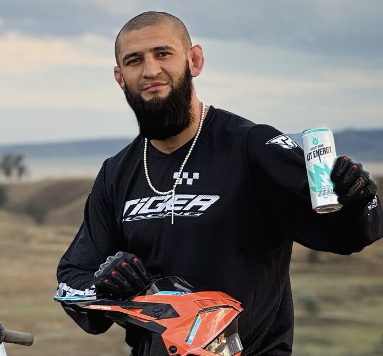The relationship between Khamzat Chimaev and Ramzan Kadyrov encapsulates a broader issue within the world of sports—one that intertwines fame, influence, and moral accountability
As the UFC navigates the complexities of its fighters’ associations, it is essential to foster an environment that prioritizes ethical considerations alongside athletic achievements.
The conversation initiated by Tim Kennedy highlights the need for all stakeholders, including athletes, organizations, and fans, to engage in a meaningful dialogue about the intersections of sports, ethics, and politics.
As the world watches, it is crucial for the UFC and its fighters to set a precedent for responsible conduct, ensuring that their legacies are defined not only by their triumphs inside the octagon but also by their choices outside of it.
Khamzat Chimaev’s career trajectory has taken a complicated turn due to his association with Ramzan Kadyrov.
As he looks to navigate the challenges of visa restrictions and inactivity, the upcoming fight against Whittaker will be pivotal in determining the next steps of his career in the UFC.
The relationship between personal connections and professional aspirations in the realm of combat sports is complex, and Chimaev’s story exemplifies the challenges that can arise when those two worlds collide.
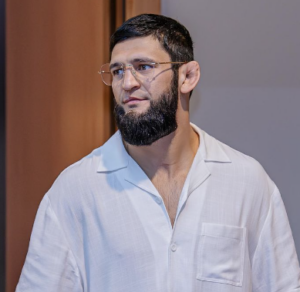
Also Read: Khamzat Chimaev vs. Israel Adesanya: Match Insights, The Last Stylebender’s’ Comeback
Table of Contents
Khamzat Chimaev and Ramzan Kadyrov: Controversial Connection
The relationship between Khamzat Chimaev, a rising star in the UFC, and Chechen dictator Ramzan Kadyrov has drawn significant scrutiny from various quarters.1
Critics argue that this association raises moral and ethical questions about the UFC’s governance of its fighters and its responsibility in addressing the actions and affiliations of those in their ecosystem.
Former UFC middleweight Tim Kennedy has been particularly vocal in condemning this dynamic, highlighting the broader implications of Chimaev’s ties to Kadyrov, a man who is regarded as one of the most controversial political figures in the world.
— Khamzat Chimaev (@KChimaev) October 17, 2024
The Human Rights Abuses of Ramzan Kadyrov
Kadyrov’s record is marred by allegations of egregious human rights violations.
He has been accused of operating concentration camps for LGBTQ+ individuals in Chechnya, where detainees are reportedly subjected to torture, humiliation, and even murder.
Moreover, Kadyrov’s regime is notorious for silencing dissent; activists, journalists, and political opponents have faced kidnapping, torture, and assassination under his rule.
The gravity of these accusations places Kadyrov in a precarious position within the international community. He is heavily sanctioned by the United States, which raises further questions about why prominent athletes would associate with someone whose actions are broadly condemned.
For many, this association is not merely a personal choice but a significant ethical lapse that could tarnish the reputations of the fighters involved, as well as the organizations that support them.
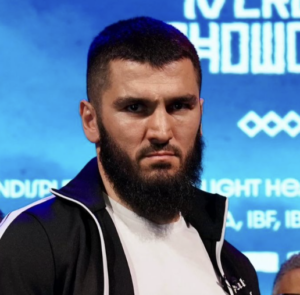
Tim Kennedy’s Critique of UFC’s Oversight
Tim Kennedy’s pointed criticism emerged on social media, where he took to X (formerly Twitter) to question the UFC’s management of its fighters.2
He found it perplexing that the UFC enforces strict regulations on aspects of a fighter’s career, including sponsorships, social media activity, and training partnerships, yet appears to turn a blind eye to Chimaev’s training with Kadyrov.
Kennedy’s statement encapsulated his frustration: “Let me get this right… It’s totally fine that the UFC controls what a fighter wears on his shorts, whether or not they train with James Krause, or what they do on social media, but it’s totally fine for them to train with a terrorist.”
Kennedy’s use of the term “terrorist” to describe Kadyrov underscores the severity of his accusations against the Chechen leader.
Kadyrov has long been linked to a series of human rights abuses, making the partnership with Chimaev seem not just controversial but morally reprehensible to some observers. Kennedy’s comments reflect a growing concern among fans and analysts regarding the ethical responsibilities of sports organizations.
UFC’s Double Standards
The UFC has a history of exerting control over its fighters, dictating everything from sponsorship agreements to social media conduct. This level of oversight raises questions about the apparent double standards in the organization’s policies.
While the UFC maintains a strict code of conduct for its fighters, it seems to allow exceptions for certain individuals based on their popularity or potential marketability. Chimaev, with his meteoric rise and engaging fighting style, embodies this duality.
Kennedy’s criticisms resonate particularly strongly in light of the UFC’s history. The promotion has previously taken firm stances against fighters who engage in behavior it deems unacceptable, yet the same rigor does not appear to apply when it comes to relationships with controversial figures like Kadyrov.
This inconsistency not only affects the integrity of the sport but also challenges the UFC’s moral standing in the eyes of fans and the broader public.
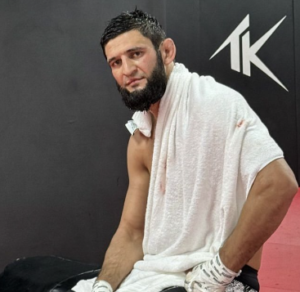
Khamzat Chimaev: Association With Kadyrov
A Broader Context
Chimaev is not alone in his association with Kadyrov. Other notable UFC fighters, including the unbeaten Khabib Nurmagomedov, Justin Gaethje, Henry Cejudo, and Kamaru Usman, have also been seen in Kadyrov’s company, prompting widespread criticism.3
The fact that these fighters, many of whom have no direct ties to Chechnya, would willingly associate with a figure as polarizing as Kadyrov raises further questions about their understanding of the implications of such relationships.
The presence of these fighters in Kadyrov’s circles suggests that the allure of fame and influence can often overshadow ethical considerations.
It reflects a troubling trend where the pursuit of popularity and financial gain can lead athletes to overlook the moral weight of their associations.
For fans, this reality can be disheartening, as it challenges the values of integrity and accountability that many hope to see in their sports heroes.
The Impact on Fighters’ Reputations
- The implications of these associations extend beyond the individuals involved. For fighters like Chimaev, being linked to a figure like Kadyrov can lead to long-lasting reputational damage.
- The backlash from fans and activists can overshadow their athletic achievements, transforming their narratives from that of champions to subjects of controversy.
- Moreover, the UFC’s apparent indifference to these associations could alienate a segment of its fan base that values ethical considerations in sports.
- The promotion risks being seen not just as a business but as an entity that prioritizes profitability over principles, which could have lasting repercussions for its brand and marketability.
- Kennedy’s critiques serve as a call for greater accountability within the UFC and among its fighters. It’s imperative that athletes recognize the weight of their associations and understand the broader implications of aligning themselves with controversial figures.
- The UFC, in turn, must examine its policies and consider the moral responsibility it holds in guiding its fighters toward ethical conduct.
- As the world of mixed martial arts continues to evolve, the focus on ethical behavior and personal responsibility becomes increasingly vital.
- Fans and activists alike are calling for a reevaluation of the connections between sports and politics, advocating for transparency and integrity within the UFC and the sport at large.
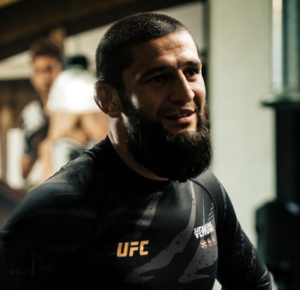
Also Read: Tracy Cortez Responds to Ailin Perez’s UFC Paris Weight Miss, Sparks Heated Exchange
Khamzat Chimaev: Friendship with Ramzan Kadyrov
Khamzat Chimaev, the rising star of the UFC, once captivated fans with his ferocious fighting style and impressive performances.
His rapid ascension within the organization made him a household name, with his ability to finish fights quickly drawing significant attention from UFC executives, including CEO Dana White.
However, his recent inactivity in the Octagon, particularly on American soil, has raised eyebrows and led to speculation regarding the reasons behind it.
A crucial factor in this scenario appears to be his close friendship with Ramzan Kadyrov, the controversial leader of Chechnya. This relationship has reportedly hindered Chimaev’s ability to secure U.S. visas, effectively barring him from entering the country.
The Kadyrov Connection
The crux of Chimaev’s struggles to fight in the U.S. lies in his association with Ramzan Kadyrov, the controversial Chechen leader known for his authoritarian regime and human rights violations.
Kadyrov is a polarizing figure, often criticized for his oppressive governance and alleged involvement in various atrocities. His close ties to the Russian government and his support for mixed martial arts in Chechnya have made him a significant figure in the combat sports community, especially among fighters from the region.
Chimaev has openly expressed his admiration for Kadyrov and frequently shares posts about their friendship on social media. This connection, while beneficial for Chimaev’s image in Chechnya, has raised concerns among U.S. immigration authorities.
Reports suggest that Chimaev’s visa applications have been repeatedly denied due to the scrutiny surrounding Kadyrov and his government. This has left Chimaev in a precarious position, unable to compete in a major market like the United States, which limits his exposure and potential earnings.
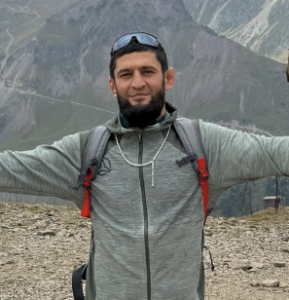
Khamzat Chimaev: Visa Complications and Inactivity
The implications of Chimaev’s friendship with Kadyrov have become increasingly evident as the fighter’s inactivity in the UFC continues.
Chimaev’s last bout in the U.S. was over a year ago, and despite his desire to return to the Octagon, he has been forced to seek fights outside American territory. The ongoing visa complications have hindered his ability to compete against top-tier opponents in the UFC, where many of the biggest events and opportunities are held.
The ramifications of these complications extend beyond just the inability to fight in the U.S. Chimaev has been sidelined during a critical period in his career.
With many fighters in his division continuing to compete and establish themselves, his absence may jeopardize his standing within the UFC hierarchy.
Fans and analysts alike are concerned that the longer he remains inactive, the more difficult it will be for him to regain his momentum and contend for titles when he eventually returns.
View this post on Instagram
The Fight Ahead: Whittaker at UFC 308
Despite these challenges, Chimaev remains determined to make his mark in the sport. He is set to face former middleweight champion Robert Whittaker at UFC 308 in Abu Dhabi, which will extend his absence from U.S.-based fights.
This matchup presents a significant opportunity for Chimaev to reestablish himself as a top contender in the middleweight division, but it also underscores the ongoing obstacles he faces due to his association with Kadyrov.
The fight against Whittaker is pivotal for Chimaev for several reasons. First, it will allow him to showcase his skills against one of the best fighters in the division, potentially solidifying his status as a title contender.
Additionally, a victory could pave the way for future matchups in the U.S. if his visa issues are resolved. However, Chimaev’s relationship with Kadyrov will likely continue to cast a shadow over his career, making it uncertain how quickly he can return to competing in front of his American fans.
Also Read: Tim Kennedy (UFC Fighter): Who Is He? Bio, Wiki, Age, Career, Net Worth 2024 and More
